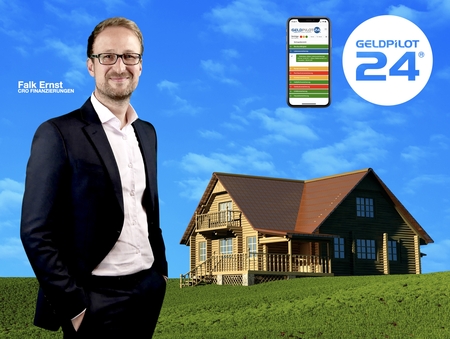

Avoiding mistakes in financing
Professional Falk Ernst exclusively on financing with GELDPILOT24
09.05.2020This multi-part series of articles will focus on the most important terms and the most frequently asked questions about real estate financing. In this respect, this series of articles is aimed at all those who are just beginning to get to grips with this topic and at those who want to refresh or deepen their knowledge.
But right from the start: Part 1: How much house can I afford?
The first question most people ask is: "How much house can I afford?" The following rule of thumb can serve as a first orientation:
Net monthly household income x 120 + equity = maximum purchase price (including utilities and any modernisation)
Here I have assumed that you should spend a maximum of 35% of the budget net for the repayment installment. On top of that there is also the interest rate. With an average loan interest rate of 2%, you would be at a total rate of about 50% of net income to achieve a full repayment within 30 years.
If you are interested in a specific property after the inspection, ask not only for the usual data such as living space and plot size, but also for defects, repair backlog and the modernizations of the last 20 years and, if possible, have the evidence of these shown. The last points are of course not necessary for a new building!
The additional purchase costs
You should not lose sight of the so-called incidental acquisition costs, as these too quickly amount to several 10,000 €. On the one hand, there is the land transfer tax to be mentioned. Depending on the federal state, it amounts to 3.5% to 6.5% of the purchase price. On top of this, there are also notary costs of approx. 1.5% of the purchase price for drawing up the purchase contract, notarisation of the purchase contract, registration of the land charge and checking the payment of the purchase price.
If necessary, an estate agent has also been commissioned to market the property. A brokerage fee is then also due for this. The law permits brokerage fees of up to 7.14 % of the purchase price.
Further additional costs
There are also recurring costs that are not directly related to the purchase, but you should still calculate them. First of all, there are the additional living expenses, such as property tax, garbage fees, water and sewage and electricity, which you have already paid with the warm rent. These may be a little higher than before because the consumption in the house is a little higher or because you moved to another district.
It is important to take out a residential building insurance, because this will protect you from financial losses if your property is damaged by fire, lightning, explosion, storm/ hail or leakage of tap water. For an additional premium you can also include other risks such as flood, backwater, earthquake, snow pressure, etc. For this reason, many banks even require you to take out a homeowners' insurance policy.
Some banks also require you to cover your loan with term life insurance. This way, in the event of the premature death of a borrower, the remaining debt can be paid off from the loan. Even if the bank does not require such insurance, it is often advisable to consider such insurance in case the remaining partner is financially unable to continue paying the installments in the event of your death.
Similarly, there is a similar situation with labour force insurance, i.e. disability insurance or insurance against incapacity to work. Here you receive a pension in the agreed amount if you are temporarily or permanently unable to work for health reasons.
Once you have found your dream property, you can start financing it.
Back to list